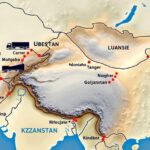Hungary Enhances Diplomatic Relations with Equatorial Guinea Through Ministerial Visit
Hungary has initiated a partnership with Equatorial Guinea during Foreign Minister Péter Szijjártó’s inaugural visit to the country, focusing on economic cooperation in sectors such as energy, water management, and education. Both nations aim to strengthen ties amid global challenges, with agreements signifying a commitment to mutual growth and sustainable development. The visit emphasizes shared values, particularly the role of Christianity in fostering collaboration.
Hungary has initiated bilateral cooperation with Equatorial Guinea, marking a significant development during the first-ever ministerial visit to the African country. Hungarian Foreign Minister Péter Szijjártó met with his counterpart, Simeon Oyono Esono Angue, in Malabo to discuss cooperative ventures in various sectors, including the economy, energy, water management, and education. Minister Szijjártó emphasized that the relations between the two nations are built on mutual respect, and he articulated the role of Christianity as a crucial foundation for their partnership. Szijjártó stated, “It is an honor to be here, the country with the largest ratio of Catholic residents in Africa,” highlighting the cultural ties that can enhance collaboration. He explained the importance of this cooperation in the context of global challenges such as the ongoing conflict in Ukraine and issues related to illegal migration, which impact security on both continents. He underscored that both countries advocate for peace and aim to avert humanitarian crises or migration pressures stemming from Africa’s anticipated population growth. During their discussions, agreements were signed to facilitate policy consultations and negotiate an economic cooperation framework. This arrangement would enable Hungarian firms to assist Equatorial Guinea in improving its water management systems and securing water supply. Furthermore, both nations will collaborate in the development of natural gas and oil production technology—an area where Hungary possesses valuable expertise that could support Equatorial Guinea’s economic growth. The countries also agreed to enhance educational exchanges by providing scholarships for Equatorial Guinean students in Hungary, particularly in healthcare. Szijjártó extended an invitation for Minister Oyono to visit Budapest to finalize the economic cooperation and grant agreements. Overall, this inaugural visit signifies a pivotal moment in Hungary-Equatorial Guinea relations, establishing a framework for future collaborative efforts across multiple sectors.
The bilateral relationship between Hungary and Equatorial Guinea has historically been minimal; however, this ministerial visit represents a strategic move to enhance diplomatic ties and foster mutual economic growth. Equatorial Guinea, rich in natural resources like natural gas and oil, is looking to modernize its industries, while Hungary seeks to expand its influence and economic cooperation in Africa. The visit underscores the importance of developing sustainable partnerships that can mitigate global challenges, such as migration and humanitarian crises, which are becoming increasingly significant in contemporary politics.
In conclusion, Hungary’s first ministerial visit to Equatorial Guinea marks a transformative step in establishing cooperative ties between the two nations. With a focus on mutual respect and collaboration in key sectors such as energy, water management, and education, both countries aim to address notable global challenges while enhancing their respective economic capacities. The agreements signed during this visit are poised to create a framework for sustainable development and further diplomatic engagement, setting a precedent for future interactions between Hungary and African states.
Original Source: dailynewshungary.com








Post Comment